2018 Dodge Challenger SRT Demon Review and First Drive
“If you keep that up, you’re going to get us kicked off of the track.”
The smiling gentleman with SRT emblazoned over his breast pocket is half-joking, of course. But only half. You see, here at Lucas Oil Raceway, just outside of Indianapolis, Indiana, there’s a fairly strict policy on toeing the National Hot Rod Association’s (NHRA) drag strip safety rules, which state that any car running below 10 seconds in the quarter-mile needs to be equipped with a roll cage — and the 2018 Dodge Challenger SRT Demon I was piloting had just turned in a time of 10.2 seconds at 128 mph.
In truth, there’s a whole lot more to NHRA regs than just “roll-cages-at-10-seconds,” but that hasn’t stopped Dodge from making immense hay with the fact that the Demon is capable of dipping well below that number, 9.65 seconds, under ideal conditions. It’s territory no other production car can claim to have ever explored, let alone a fully street legal muscle machine backed by a warranty.
FAST FACTS
| Engine: | 6.2L supercharged V8 |
| Output: | 840 hp, 770 lb-ft of torque (on race fuel) |
| Transmission: | 8-speed auto |
| Fuel Economy (MPG): | LOL |
| US Price: | $83,295 |
| CAN Price: | $109,996 |
| : | (All prices include destination fees) |
Lucas Oil Raceway offers a rare chance to engage with the beast on its home turf. Whereas the Challenger SRT Hellcat that this new model is based on was designed to be an equal-opportunity destroyer of worlds, the Demon is intended exclusively as a straight-line eviscerator of the first order. SRT’s engineering team took the Hellcat’s already bonkers 707-horsepower 6.2-liter supercharged V8 and dialed in another 101 horses on pump gas, with a further 39 available should you run 100-octane race fuel. Taken together with the Nitto 315/40R-18 NT05 drag radials mounted at the rear, the skinny bicycle tires available on the front, and the fact that the passenger seats are offered only as optional equipment, and you’ve got a clear idea that the Demon yearns to live its life a quarter mile at a time.
What is it like to watch a quarter mile evaporate in front of your eyes in 10 seconds or less? Not all drag cars take the same path from the staging lights to the return lanes, but in the Demon, the closest equivalent would be to close your eyes and imagine yourself strapped into an enormous catapult — you know, like the ones they use to launch fighter jets off of oh-so-short carrier decks. Those 840 horses melt the world around you into streams of multicolored light, like a kaleidoscopic hyperdrive whose violence is smoothed over by the lightheaded ecstasy that comes from flaunting the laws of physics, set to a metal-on-metal soundtrack that would liquefy even the mightiest subwoofer.
ALSO SEE: Top 10 Things You Need to Know About the 2018 Dodge Demon
To make that magical sub-10-second number happen — and to keep it within the realm of possibility throughout an entire day at the drag strip — required Dodge to seriously rethink several aspects of the SRT Hellcat’s drivetrain and suspension setup. The three primary challenges were to produce more power, to put that grunt repeatedly to the ground without grenading every component between the engine and the rear end, and to do so reliably enough that you can drive home at the end of the afternoon.
To satisfy that first requirement, SRT installed a larger 2.7-liter supercharger running 14.5 psi (versus 11.6 in the Hellcat) to feed the Demon’s V8 and then raised the engine’s redline to 6,500 rpm. The latter has to do with the 150 milliseconds it takes the car’s eight-speed automatic transmission to swap gears because while full-throttle shifts are initiated at 6,300 rpm, there’s still 200 revs to get through before it’s a done deal. A liquid-to-air intercooler that’s kept frosty by diverting the vehicle’s air conditioning system is also present and accounted for (and settled temperatures five degrees below ambient through the entire 90 degrees F or 32 degrees C afternoon), and an enormous air scoop defines the Demon’s massive hood in a further bid to provide a continuous supply of cool air for the engine. Keen eyes will also spot the car’s driver’s side hollow headlight that contributes to the 18 percent improvement in air induction volume versus the Hellcat.
ALSO SEE: Challenger Hellcat Widebody Brings More Grip, New Goodies
If you want to get the most out of the 2018 Dodge Challenger SRT Demon’s monstrous motor, you’ll have to cough up an additional dollar for the Demon Crate, an option that adds a 100-octane tune (accessed via the car’s Drag drive mode or a center stack switch). On top of the 840 horses, you’ll also benefit from a whopping 770 lb-ft of torque, with both of these numbers easily besting any other eight-cylinder car on the market.
Of course, if the Demon’s only claim to fame was to be the world’s most epic burnout machine (and with factory line-lock, it’s certainly capable of grabbing that crown), things would be a lot less interesting as you rolled up to the staging lights. Fortunately, the Challenger’s suspension has been thoroughly reworked to facilitate weight transfer towards the rear of the car, including hollow swaybars that offer a 75 percent lower rate up front and 44 percent at the rear, adaptive shocks that are tuned to squat the car when launching in Drag mode, and springs that are roughly one-third less stiff than the Hellcat’s. Throw in an automatic transmission with a stronger prop shaft, a beefier rear differential, and larger half-shafts, all fed by a truly astounding transbrake that removes lash from the drivetrain and pre-loads 8 psi of boost at the start line, and you’ve got a surprisingly consistent ticket to the low-10s — and if you’re lucky, or good, or both, maybe even lower than that.
ALSO SEE: You’ll Have to Sign a Deal with the Devil to Own a Dodge Demon
It’s that repeatable performance that impressed me during my time behind the wheel at Lucas Oil. Of the six cars running quarter-mile passes, not one received any kind of break from the enthusiastic affections of drivers with varying levels of drag strip experience, which meant run after blistering, VHT-prepped run on what was a hot and sunny afternoon. The car I was driving actually got quicker with each pass (once I figured out the Konami code that was the transbrake activation sequence), which is simply not something I have experienced in other, less-powerful production vehicles more prone to heat soak and mechanical complaint after a handful of hammer-down stints.
Dodge has also gone to great lengths to ensure that the SRT Demon is more than just trailer royalty. On the street in 808-horsepower tune, the coupe feels very much like any other Challenger — large, comfortable, and relatively docile — until you get deep into the accelerator, at which point the car hooks and scoots with remarkable dignity. Unlike the twitchier antics of the less-tired, stiffer Hellcat, the Demon never presented me with any reason to worry about anything out on the road other than perhaps the continued possession of my driver’s license.
The Verdict: 2018 Dodge Challenger SRT Demon Review and First Drive
Truth be told, there’s really nothing else like the Challenger SRT Demon on the market, outside of factory-built, track-only drag specials from Ford (the Cobra Jet Mustang) and Chevrolet (COPO Camaro). Still, with a starting price of $83,295 ($109,996 in Canada), and production limited to just 3,000 units for the U.S. and a further 300 for Canada, it’s possible the Demon’s forked tongue isn’t persuasive enough to get you to buy in.
That’s OK because for the 2018 model year, SRT has created a veritable family of supercharged monstrosities for you to salivate over. It’s bizarre to use the term “entry-level” to describe the “standard” 707-horsepower Challenger SRT Hellcat, but with the Demon perched at the top and the new SRT Hellcat Widebody (with its, well, wider body and fatter, 305/35R-20 Pirelli P-Zero tires) sitting just below it at just under $72,000, suddenly the $62k base model looks a bit like a bargain. Sure, the Widebody handled better around the infield road course at Indianapolis Motor Speedway the morning before my drag session compared to its less-planted sibling, but not everyone is willing to drop $10k on a wider track and meatier rubber.
Bargain Hellcats? 707 horsepower as an appetizer? What a wonderful, weird world we’re now living in.
Discuss this article on our Hellcat Forum
LOVE IT
- 840 horsepower on race gas is the definition of insanity
- Amazingly compliant on the street
- Repeatable drag strip dominance is very much within reach
LEAVE IT
- Significant price bump over the Hellcat
- Skinny tires and no seats skirt the edge of the what could be considered a street car
- If you thought your tire bill was expensive now…
More by Benjamin Hunting



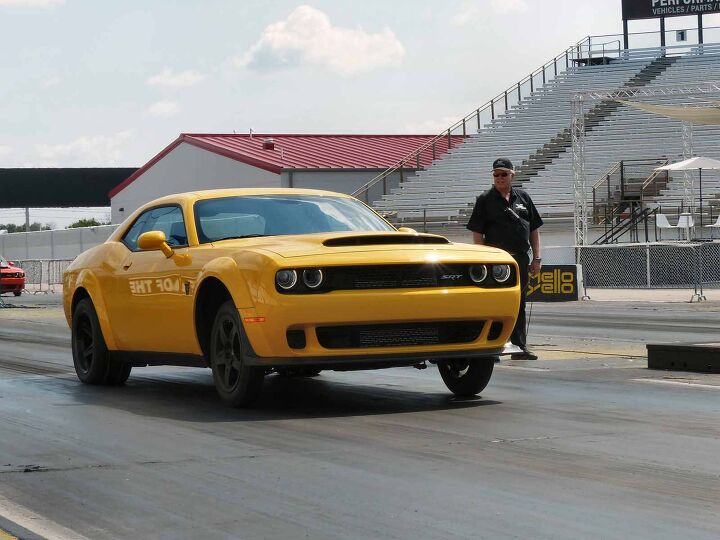
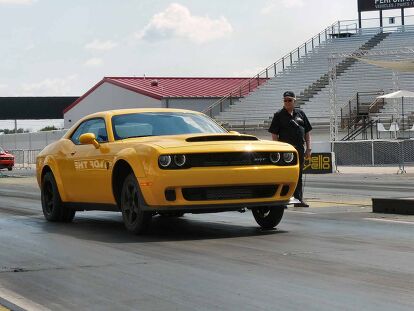










































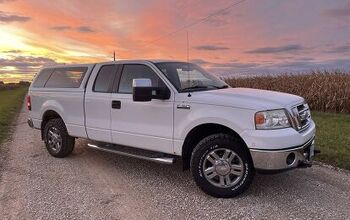

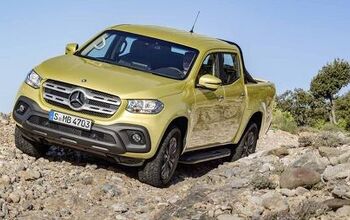
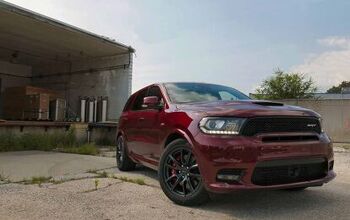
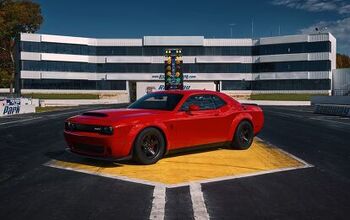
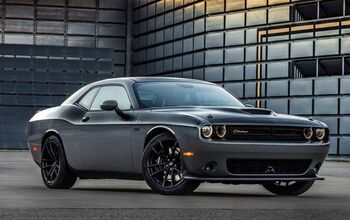
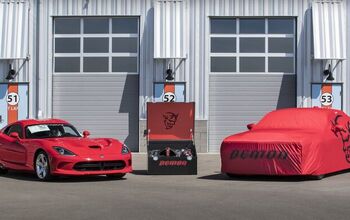










Comments
Join the conversation
Why the MPH is so low on your 10.2@128... What type of gas were you running.
So, just why ISN'T the car equipped with a roll cage?